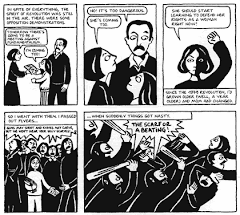- How does Marjane connect to the everyday human being? How is she different?
- How does this style promote what is being said in the text?
- By the end of the comic, is religion a positive or negative force for Marjane?
- How can we judge what is beautiful?
- Does anyone actually have a personality? Do you own it or is it part of someone/something else?
- Is family crucial for self-realization?
- If this comic was set in our era, what changes would be made? How would it be the same/different?
- What changes happened as a result of her journey?
- How does Marjane grow mentally and physically? Does one play off the other?
After the question storming, we broke off into discussion groups with a main idea question. My group consisted of David, Lucy, Denitza and myself. Our question was "How can we judge what is beautiful?" and this question originated from Bhanesha.
There are always different images of what is beautiful, you taste is different than mine. It is difficult to judge what is more or less beautiful with such a general perspective. Also, we are only given the knowledge of our perception of beauty, we do not really know what another person's version of beautiful is, until they tell you what it is they call beauty. Examples of these images are certainly comics, novels, movies, photos, songs...etc. All mediums of art are different or the same image of beauty just taken by different people who blend in their own ideas with the original one.
"There are two forms of beauty, inner and outer beauty, "said lucy.
"Yes but the dictionary says that Beauty is defined as a fine specimen," retorted Denitza.
"Just because the dicionary says it, doesn't mean its true." David added in quietly. His comment was so quiet that Denitza probablly didn't hear. Geneva smiled to herself on the side. If Denitza had known what David said she would have immediately gone into 'rebuttal mode' and would try to dictionarify David's head off with all her facts (which probablly would come from the secret vault of facts about why beauty is skin deep, which came from her training days in JRP).
"I think that the people who are pretty have an easier and more happy personality. So then they have inner and outer beauty because they are not shy and they aren't ugly too." Lucy said, trying to change the subject.
"Exactly, because the people with outer beauty have the confidence to develop an open personality," said Denitza.
"But does your personality define your beauty? Can a personality be beautiful?" David questioned.
"Well Marjane seems to think so, because on page 190 she percieves her growth as a deformity and gathers the ugly image of herself from other people's images of beautiful. This is a result of culture. The region she grew up in and the region she was living in at the time (Austria) had completely different visions of beauty, so she was stuck between her old Iranian image of beauty and the new image of Austrian beauty. Almost as if the other people around her are her mirror and she only sees the ugly image that they reflect of her" said Geneva finally.
"But she can't compare to the white people in Europe. Like me, I can't compare to the people here because I am Chinese." said David (lol just kidding, Lucy said this :P)
This concludes a short snippet of our conversation at the park.
Geneva <3







I like the dialogue!
ReplyDeleteI believe that beauty isn't just about if the distance from your nose to your chin is the right measurement or that your hair is a certain colour and length. I think one of the most beautiful things are happiness and contentment. Marjane isn't just beautiful on page 197 or page 274 because she got a new haircut or wears makeup, it is because she is happy, and content with herself.
ok- so what about the "equality of hotness rule?" Ya know, like, "she's out of your league" or whatever. I definitely think that personality can make a person more and/or less attractive, but look around and see if everyone follows that rule anyway..... I wonder.
ReplyDeleteCool dialogue